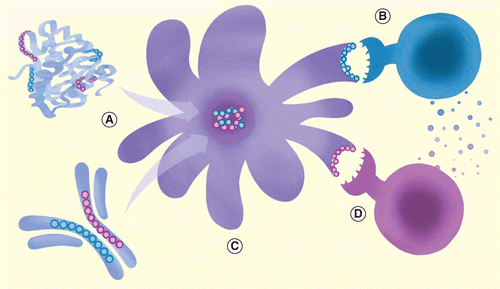New EpiVax Publication:
“Do Tregitopes have the potential to impact the current treatment landscape of autoimmune diseases?”
December 2013, Vol. 9, No. 12 , Pages 1155-1157
Anne S De Groot
EpiVax, Inc.,
146 Clifford St, Providence, RI 02903,
USA and University of Rhode Island, Institute for Immunology and Informatics, RI, USA
USA +1 401 272 2123 +1 401 272 7562 dr.annie.degroot@gmail.com; annied@epivax.com
Tregitopes are regulatory T-cell epitope sequences contained in IgG that were discovered by the team of De Groot and Martin in the course of searching for T effector (Teff) epitopes in monoclonal antibody (mAb) therapeutics [1,2]. These highly conserved (in IgG), promiscuous Treg epitopes have been shown to trigger the expansion of Tregs in vitro. A retrospective review of the T-cell epitope (and Tregitope) content of therapeutic mAbs, published in 2009 [3], revealed a close correlation between the presence of Tregitopes and the absence of HLA-binding Teff epitopes, with the lack of mAb immunogenicity in clinical use.
Taking this observation one step further, the presence of Treg epitopes in IgG might explain why immunoglobulins, which are produced by B cells that undergo somatic hypermutation in the periphery, do not generally elicit the expected immune response against the new ‘foreign’ hypervariable (complementarity determining regions, or CDR) sequences. Recognition of the importance of Tregitopes in mAb therapeutics led to the incorporation of Tregitope-specific adjustments in certain immunogenicity predictions, improving the accuracy of the results [4,5].
 Tregitopes may also explain, in part, the tolerance-inducing effect of intravenous immunoglobulin (IVIg) therapy [6]). This theory is supported by reports that IVIg-induced expansion of Tregs in vitro and in vivo, [7–9], and IVIg experts generally agree that Treg epitopes such as Tregitopes may be contributing to the tolerizing effects of IVIg [10,11]. Although it is only approved for use in a handful of diseases [12], IVIg is used off-label for hundreds of conditions [13–19].
Tregitopes may also explain, in part, the tolerance-inducing effect of intravenous immunoglobulin (IVIg) therapy [6]). This theory is supported by reports that IVIg-induced expansion of Tregs in vitro and in vivo, [7–9], and IVIg experts generally agree that Treg epitopes such as Tregitopes may be contributing to the tolerizing effects of IVIg [10,11]. Although it is only approved for use in a handful of diseases [12], IVIg is used off-label for hundreds of conditions [13–19].
Recently published in vivo studies of Tregitopes in mouse models of human autoimmune diseases have further validated the Tregitope discovery… FULL ARTICLE HERE
